Human Relationships and Life Transitions
VerifiedAdded on 2023/06/03
|9
|2254
|500
AI Summary
This article discusses the importance of human relationships and life transitions in a child's growth. It covers psychosocial development, theories of psychosocial development, and factors that affect psychosocial development. The article also relates psychosocial development to a case study of a two-year-old child.
Contribute Materials
Your contribution can guide someone’s learning journey. Share your
documents today.
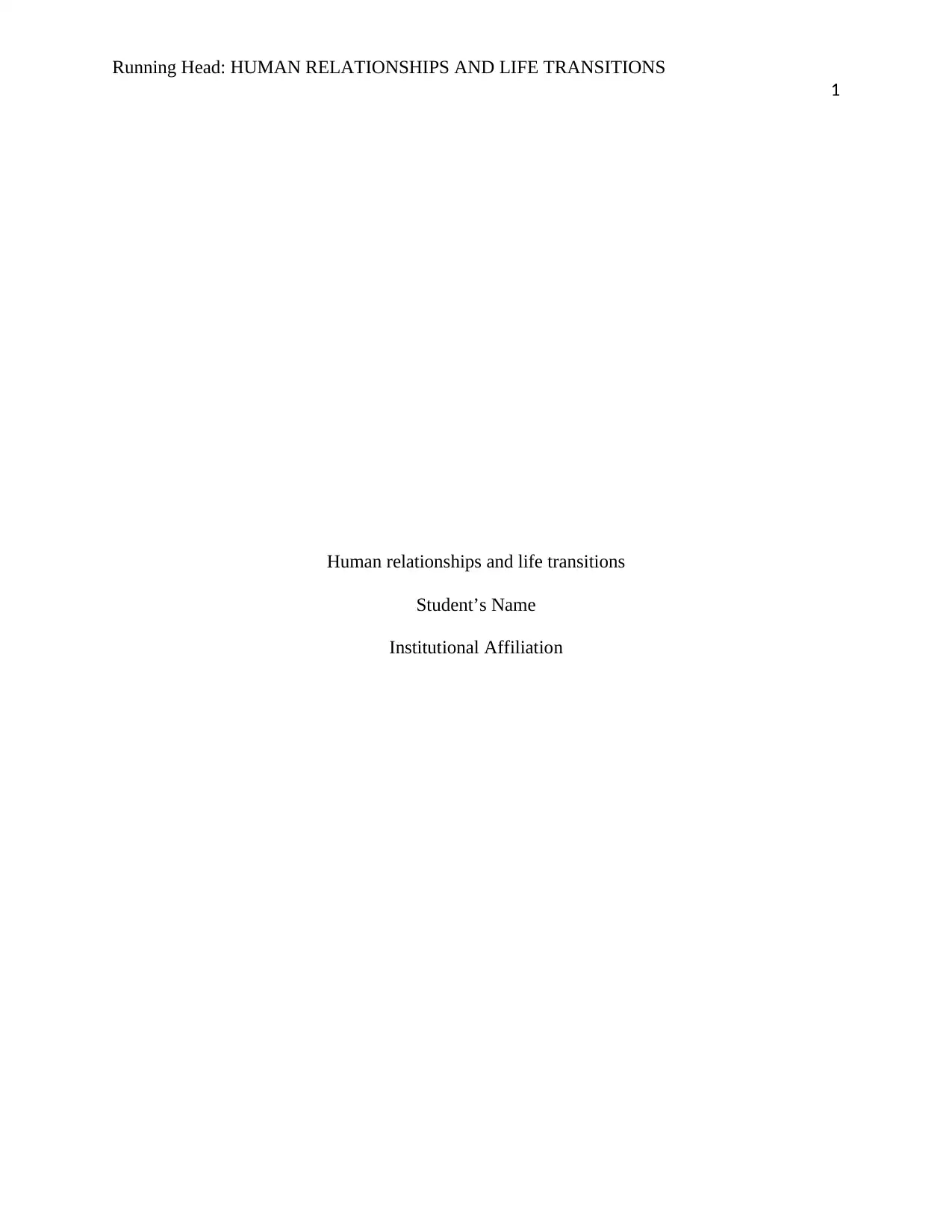
Running Head: HUMAN RELATIONSHIPS AND LIFE TRANSITIONS
1
Human relationships and life transitions
Student’s Name
Institutional Affiliation
1
Human relationships and life transitions
Student’s Name
Institutional Affiliation
Secure Best Marks with AI Grader
Need help grading? Try our AI Grader for instant feedback on your assignments.
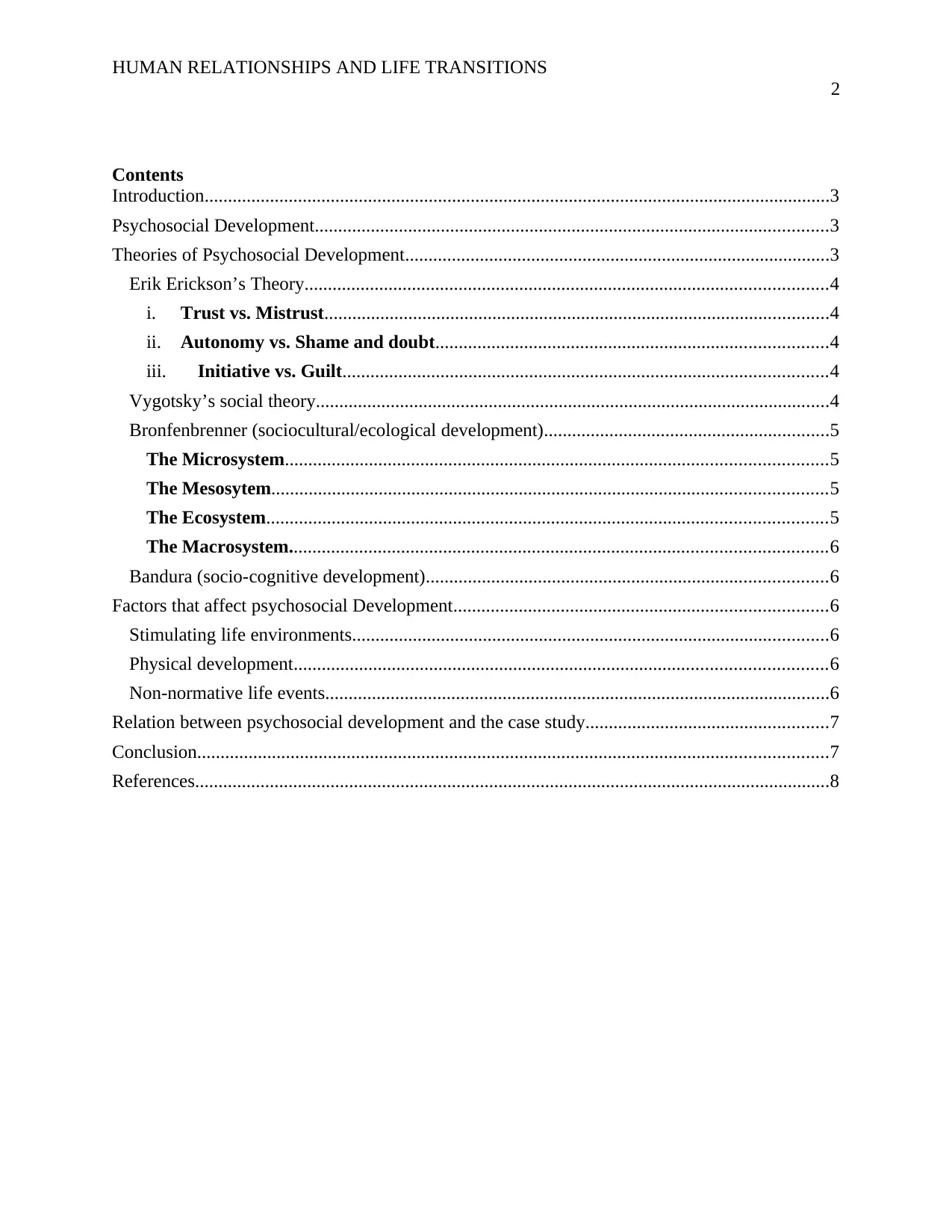
HUMAN RELATIONSHIPS AND LIFE TRANSITIONS
2
Contents
Introduction......................................................................................................................................3
Psychosocial Development..............................................................................................................3
Theories of Psychosocial Development...........................................................................................3
Erik Erickson’s Theory................................................................................................................4
i. Trust vs. Mistrust............................................................................................................4
ii. Autonomy vs. Shame and doubt....................................................................................4
iii. Initiative vs. Guilt........................................................................................................4
Vygotsky’s social theory..............................................................................................................4
Bronfenbrenner (sociocultural/ecological development).............................................................5
The Microsystem....................................................................................................................5
The Mesosytem.......................................................................................................................5
The Ecosystem........................................................................................................................5
The Macrosystem...................................................................................................................6
Bandura (socio-cognitive development)......................................................................................6
Factors that affect psychosocial Development................................................................................6
Stimulating life environments......................................................................................................6
Physical development..................................................................................................................6
Non-normative life events............................................................................................................6
Relation between psychosocial development and the case study....................................................7
Conclusion.......................................................................................................................................7
References........................................................................................................................................8
2
Contents
Introduction......................................................................................................................................3
Psychosocial Development..............................................................................................................3
Theories of Psychosocial Development...........................................................................................3
Erik Erickson’s Theory................................................................................................................4
i. Trust vs. Mistrust............................................................................................................4
ii. Autonomy vs. Shame and doubt....................................................................................4
iii. Initiative vs. Guilt........................................................................................................4
Vygotsky’s social theory..............................................................................................................4
Bronfenbrenner (sociocultural/ecological development).............................................................5
The Microsystem....................................................................................................................5
The Mesosytem.......................................................................................................................5
The Ecosystem........................................................................................................................5
The Macrosystem...................................................................................................................6
Bandura (socio-cognitive development)......................................................................................6
Factors that affect psychosocial Development................................................................................6
Stimulating life environments......................................................................................................6
Physical development..................................................................................................................6
Non-normative life events............................................................................................................6
Relation between psychosocial development and the case study....................................................7
Conclusion.......................................................................................................................................7
References........................................................................................................................................8
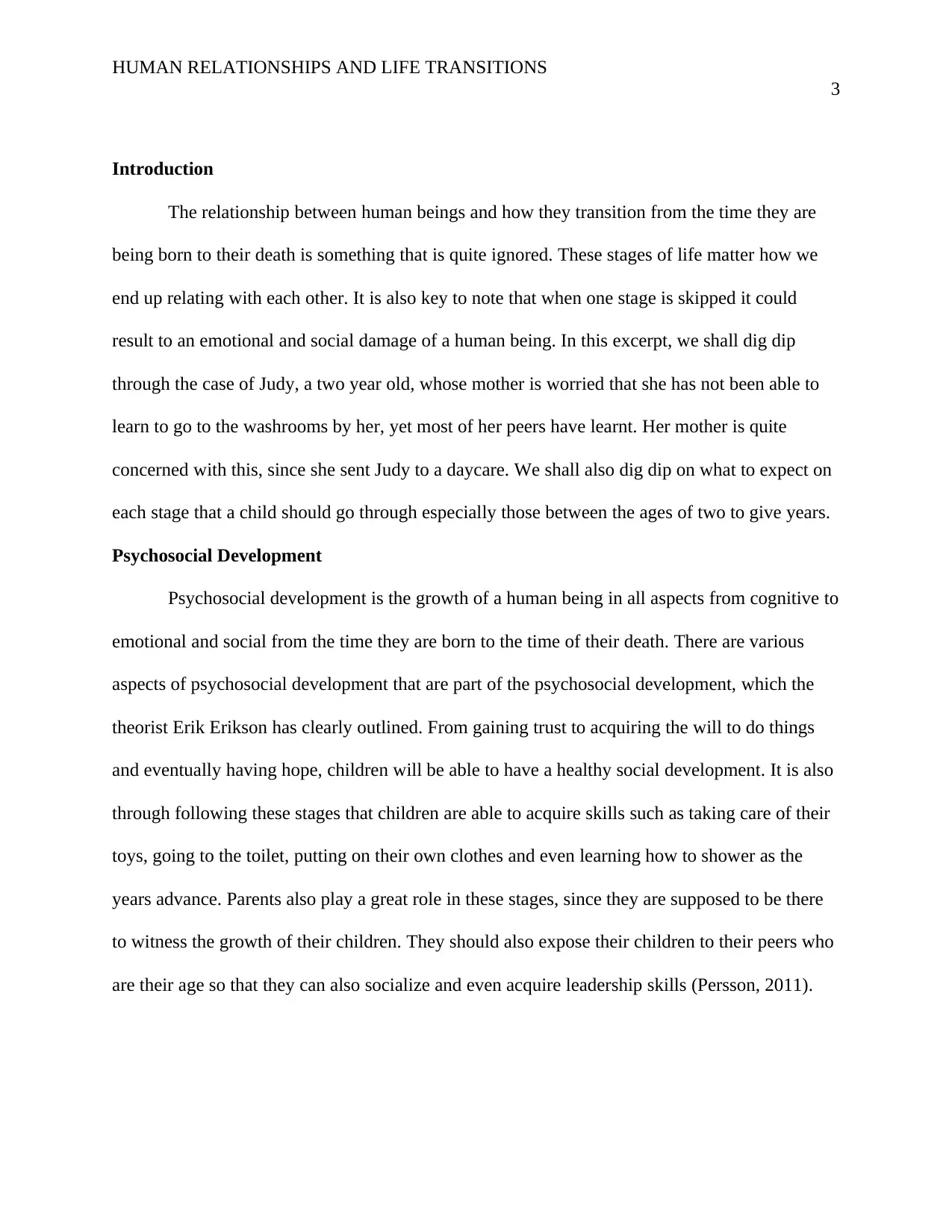
HUMAN RELATIONSHIPS AND LIFE TRANSITIONS
3
Introduction
The relationship between human beings and how they transition from the time they are
being born to their death is something that is quite ignored. These stages of life matter how we
end up relating with each other. It is also key to note that when one stage is skipped it could
result to an emotional and social damage of a human being. In this excerpt, we shall dig dip
through the case of Judy, a two year old, whose mother is worried that she has not been able to
learn to go to the washrooms by her, yet most of her peers have learnt. Her mother is quite
concerned with this, since she sent Judy to a daycare. We shall also dig dip on what to expect on
each stage that a child should go through especially those between the ages of two to give years.
Psychosocial Development
Psychosocial development is the growth of a human being in all aspects from cognitive to
emotional and social from the time they are born to the time of their death. There are various
aspects of psychosocial development that are part of the psychosocial development, which the
theorist Erik Erikson has clearly outlined. From gaining trust to acquiring the will to do things
and eventually having hope, children will be able to have a healthy social development. It is also
through following these stages that children are able to acquire skills such as taking care of their
toys, going to the toilet, putting on their own clothes and even learning how to shower as the
years advance. Parents also play a great role in these stages, since they are supposed to be there
to witness the growth of their children. They should also expose their children to their peers who
are their age so that they can also socialize and even acquire leadership skills (Persson, 2011).
3
Introduction
The relationship between human beings and how they transition from the time they are
being born to their death is something that is quite ignored. These stages of life matter how we
end up relating with each other. It is also key to note that when one stage is skipped it could
result to an emotional and social damage of a human being. In this excerpt, we shall dig dip
through the case of Judy, a two year old, whose mother is worried that she has not been able to
learn to go to the washrooms by her, yet most of her peers have learnt. Her mother is quite
concerned with this, since she sent Judy to a daycare. We shall also dig dip on what to expect on
each stage that a child should go through especially those between the ages of two to give years.
Psychosocial Development
Psychosocial development is the growth of a human being in all aspects from cognitive to
emotional and social from the time they are born to the time of their death. There are various
aspects of psychosocial development that are part of the psychosocial development, which the
theorist Erik Erikson has clearly outlined. From gaining trust to acquiring the will to do things
and eventually having hope, children will be able to have a healthy social development. It is also
through following these stages that children are able to acquire skills such as taking care of their
toys, going to the toilet, putting on their own clothes and even learning how to shower as the
years advance. Parents also play a great role in these stages, since they are supposed to be there
to witness the growth of their children. They should also expose their children to their peers who
are their age so that they can also socialize and even acquire leadership skills (Persson, 2011).
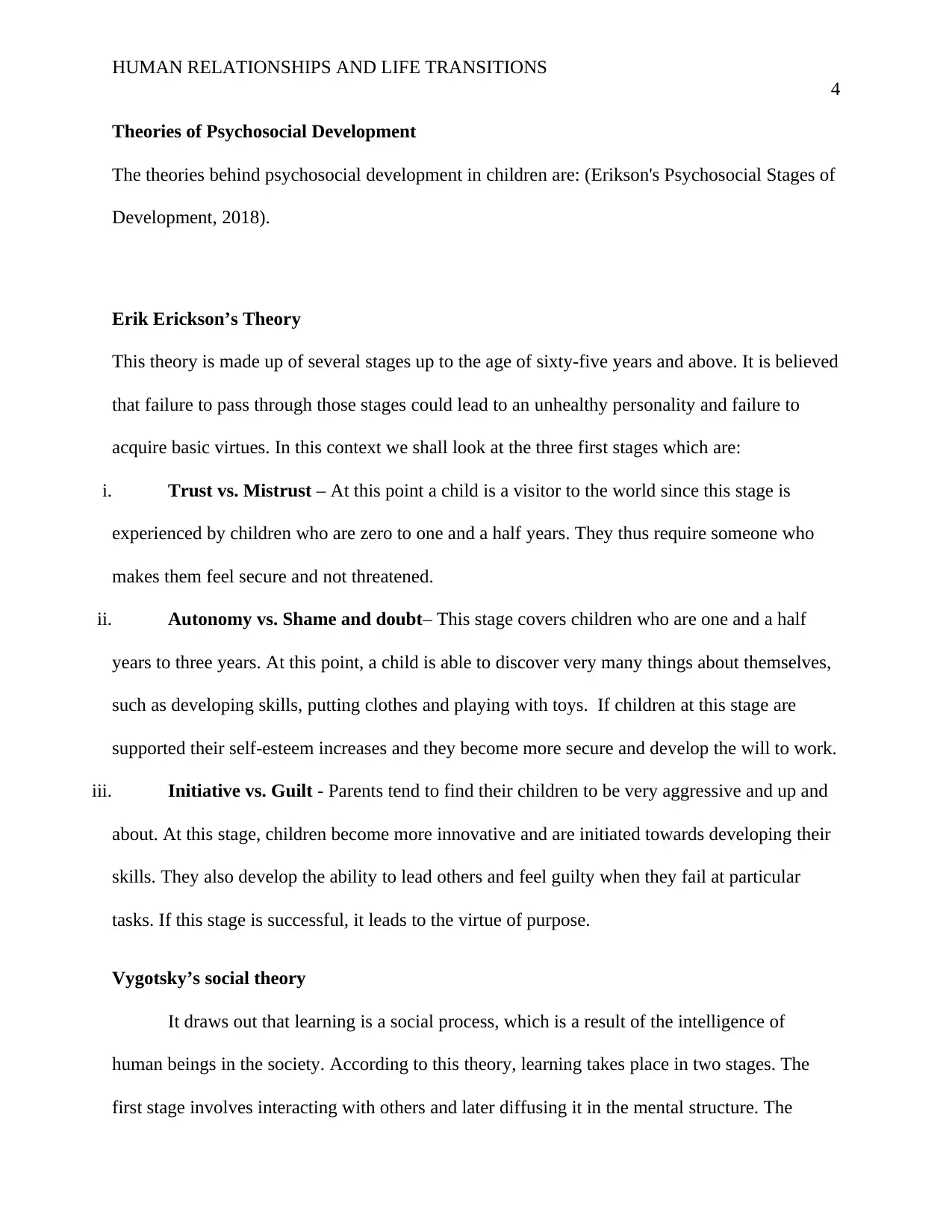
HUMAN RELATIONSHIPS AND LIFE TRANSITIONS
4
Theories of Psychosocial Development
The theories behind psychosocial development in children are: (Erikson's Psychosocial Stages of
Development, 2018).
Erik Erickson’s Theory
This theory is made up of several stages up to the age of sixty-five years and above. It is believed
that failure to pass through those stages could lead to an unhealthy personality and failure to
acquire basic virtues. In this context we shall look at the three first stages which are:
i. Trust vs. Mistrust – At this point a child is a visitor to the world since this stage is
experienced by children who are zero to one and a half years. They thus require someone who
makes them feel secure and not threatened.
ii. Autonomy vs. Shame and doubt– This stage covers children who are one and a half
years to three years. At this point, a child is able to discover very many things about themselves,
such as developing skills, putting clothes and playing with toys. If children at this stage are
supported their self-esteem increases and they become more secure and develop the will to work.
iii. Initiative vs. Guilt - Parents tend to find their children to be very aggressive and up and
about. At this stage, children become more innovative and are initiated towards developing their
skills. They also develop the ability to lead others and feel guilty when they fail at particular
tasks. If this stage is successful, it leads to the virtue of purpose.
Vygotsky’s social theory
It draws out that learning is a social process, which is a result of the intelligence of
human beings in the society. According to this theory, learning takes place in two stages. The
first stage involves interacting with others and later diffusing it in the mental structure. The
4
Theories of Psychosocial Development
The theories behind psychosocial development in children are: (Erikson's Psychosocial Stages of
Development, 2018).
Erik Erickson’s Theory
This theory is made up of several stages up to the age of sixty-five years and above. It is believed
that failure to pass through those stages could lead to an unhealthy personality and failure to
acquire basic virtues. In this context we shall look at the three first stages which are:
i. Trust vs. Mistrust – At this point a child is a visitor to the world since this stage is
experienced by children who are zero to one and a half years. They thus require someone who
makes them feel secure and not threatened.
ii. Autonomy vs. Shame and doubt– This stage covers children who are one and a half
years to three years. At this point, a child is able to discover very many things about themselves,
such as developing skills, putting clothes and playing with toys. If children at this stage are
supported their self-esteem increases and they become more secure and develop the will to work.
iii. Initiative vs. Guilt - Parents tend to find their children to be very aggressive and up and
about. At this stage, children become more innovative and are initiated towards developing their
skills. They also develop the ability to lead others and feel guilty when they fail at particular
tasks. If this stage is successful, it leads to the virtue of purpose.
Vygotsky’s social theory
It draws out that learning is a social process, which is a result of the intelligence of
human beings in the society. According to this theory, learning takes place in two stages. The
first stage involves interacting with others and later diffusing it in the mental structure. The
Secure Best Marks with AI Grader
Need help grading? Try our AI Grader for instant feedback on your assignments.
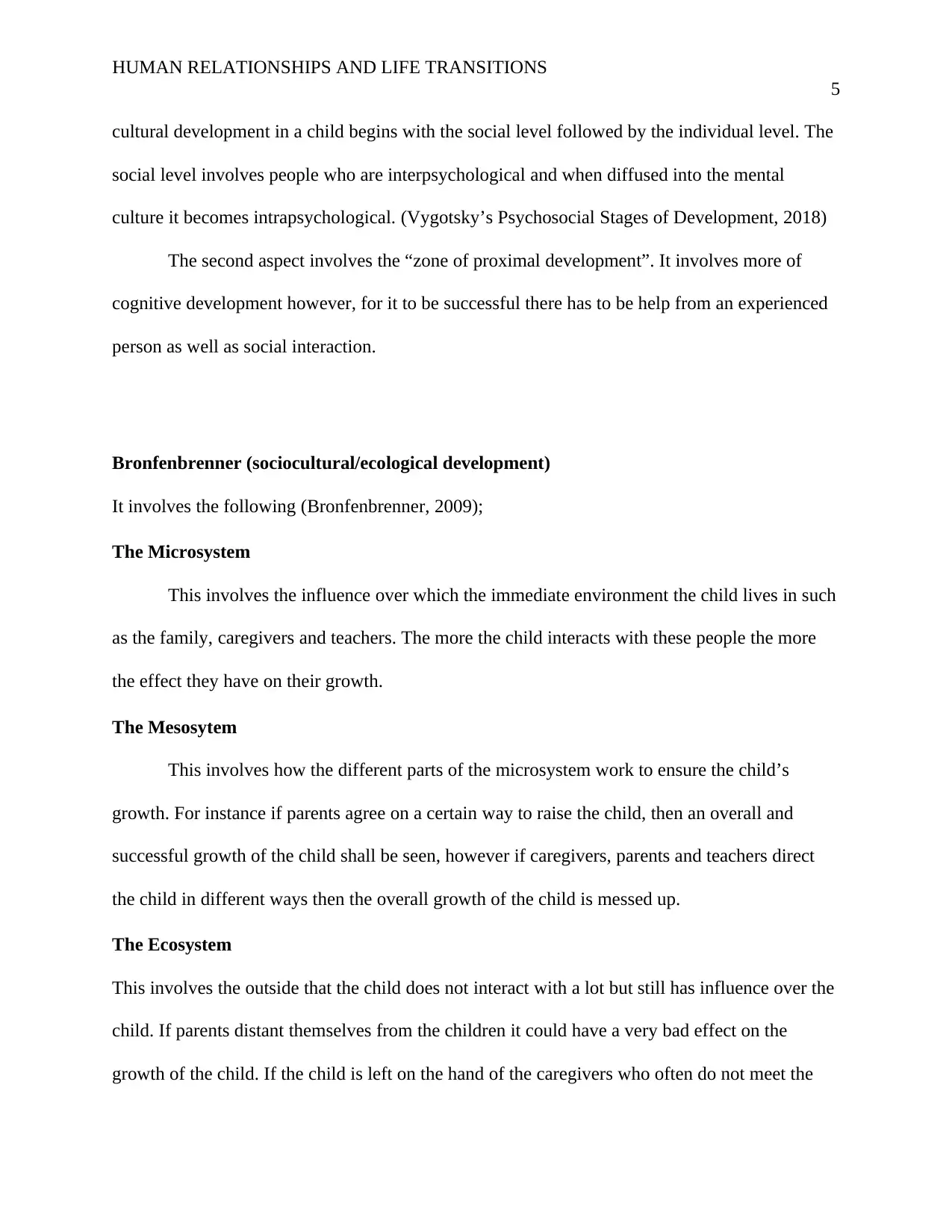
HUMAN RELATIONSHIPS AND LIFE TRANSITIONS
5
cultural development in a child begins with the social level followed by the individual level. The
social level involves people who are interpsychological and when diffused into the mental
culture it becomes intrapsychological. (Vygotsky’s Psychosocial Stages of Development, 2018)
The second aspect involves the “zone of proximal development”. It involves more of
cognitive development however, for it to be successful there has to be help from an experienced
person as well as social interaction.
Bronfenbrenner (sociocultural/ecological development)
It involves the following (Bronfenbrenner, 2009);
The Microsystem
This involves the influence over which the immediate environment the child lives in such
as the family, caregivers and teachers. The more the child interacts with these people the more
the effect they have on their growth.
The Mesosytem
This involves how the different parts of the microsystem work to ensure the child’s
growth. For instance if parents agree on a certain way to raise the child, then an overall and
successful growth of the child shall be seen, however if caregivers, parents and teachers direct
the child in different ways then the overall growth of the child is messed up.
The Ecosystem
This involves the outside that the child does not interact with a lot but still has influence over the
child. If parents distant themselves from the children it could have a very bad effect on the
growth of the child. If the child is left on the hand of the caregivers who often do not meet the
5
cultural development in a child begins with the social level followed by the individual level. The
social level involves people who are interpsychological and when diffused into the mental
culture it becomes intrapsychological. (Vygotsky’s Psychosocial Stages of Development, 2018)
The second aspect involves the “zone of proximal development”. It involves more of
cognitive development however, for it to be successful there has to be help from an experienced
person as well as social interaction.
Bronfenbrenner (sociocultural/ecological development)
It involves the following (Bronfenbrenner, 2009);
The Microsystem
This involves the influence over which the immediate environment the child lives in such
as the family, caregivers and teachers. The more the child interacts with these people the more
the effect they have on their growth.
The Mesosytem
This involves how the different parts of the microsystem work to ensure the child’s
growth. For instance if parents agree on a certain way to raise the child, then an overall and
successful growth of the child shall be seen, however if caregivers, parents and teachers direct
the child in different ways then the overall growth of the child is messed up.
The Ecosystem
This involves the outside that the child does not interact with a lot but still has influence over the
child. If parents distant themselves from the children it could have a very bad effect on the
growth of the child. If the child is left on the hand of the caregivers who often do not meet the
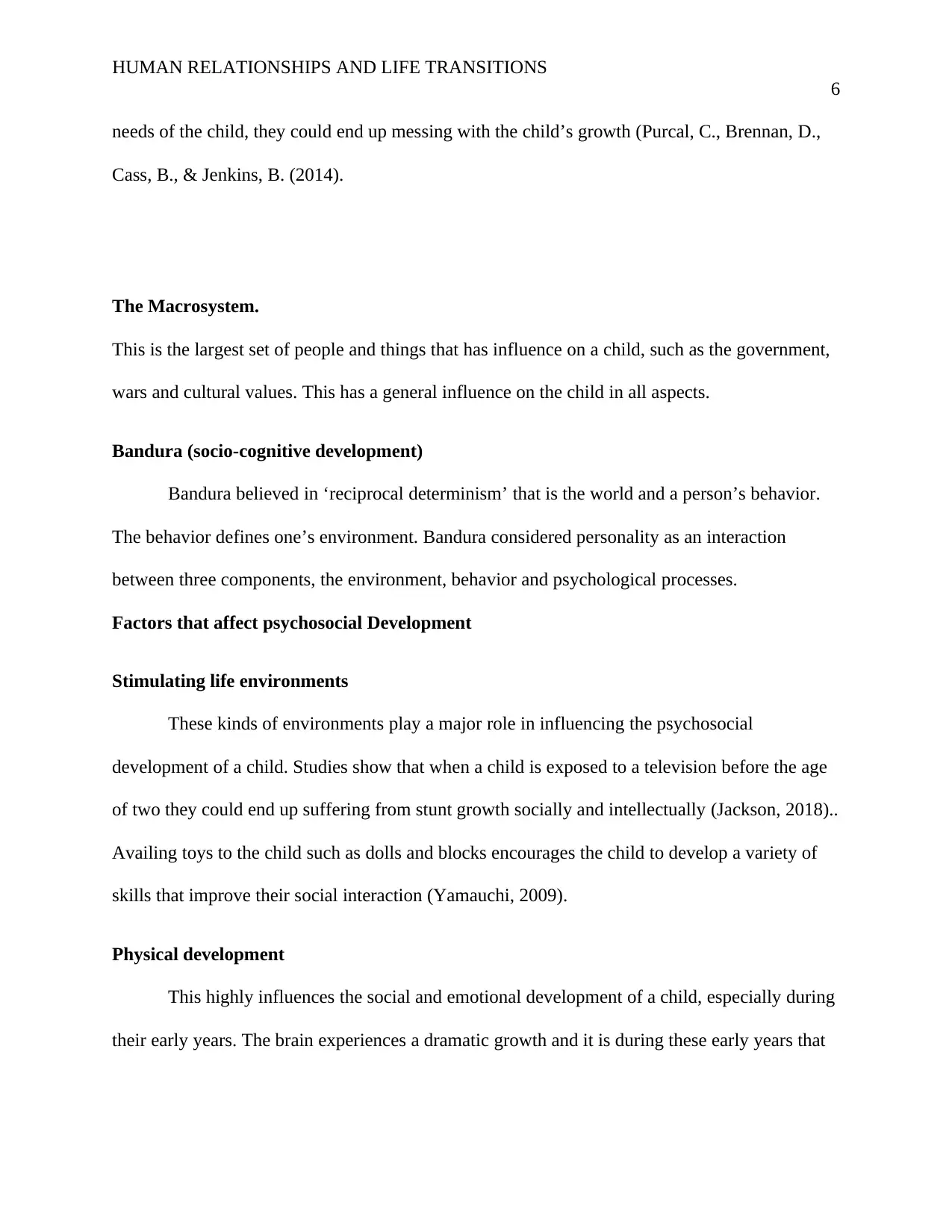
HUMAN RELATIONSHIPS AND LIFE TRANSITIONS
6
needs of the child, they could end up messing with the child’s growth (Purcal, C., Brennan, D.,
Cass, B., & Jenkins, B. (2014).
The Macrosystem.
This is the largest set of people and things that has influence on a child, such as the government,
wars and cultural values. This has a general influence on the child in all aspects.
Bandura (socio-cognitive development)
Bandura believed in ‘reciprocal determinism’ that is the world and a person’s behavior.
The behavior defines one’s environment. Bandura considered personality as an interaction
between three components, the environment, behavior and psychological processes.
Factors that affect psychosocial Development
Stimulating life environments
These kinds of environments play a major role in influencing the psychosocial
development of a child. Studies show that when a child is exposed to a television before the age
of two they could end up suffering from stunt growth socially and intellectually (Jackson, 2018)..
Availing toys to the child such as dolls and blocks encourages the child to develop a variety of
skills that improve their social interaction (Yamauchi, 2009).
Physical development
This highly influences the social and emotional development of a child, especially during
their early years. The brain experiences a dramatic growth and it is during these early years that
6
needs of the child, they could end up messing with the child’s growth (Purcal, C., Brennan, D.,
Cass, B., & Jenkins, B. (2014).
The Macrosystem.
This is the largest set of people and things that has influence on a child, such as the government,
wars and cultural values. This has a general influence on the child in all aspects.
Bandura (socio-cognitive development)
Bandura believed in ‘reciprocal determinism’ that is the world and a person’s behavior.
The behavior defines one’s environment. Bandura considered personality as an interaction
between three components, the environment, behavior and psychological processes.
Factors that affect psychosocial Development
Stimulating life environments
These kinds of environments play a major role in influencing the psychosocial
development of a child. Studies show that when a child is exposed to a television before the age
of two they could end up suffering from stunt growth socially and intellectually (Jackson, 2018)..
Availing toys to the child such as dolls and blocks encourages the child to develop a variety of
skills that improve their social interaction (Yamauchi, 2009).
Physical development
This highly influences the social and emotional development of a child, especially during
their early years. The brain experiences a dramatic growth and it is during these early years that
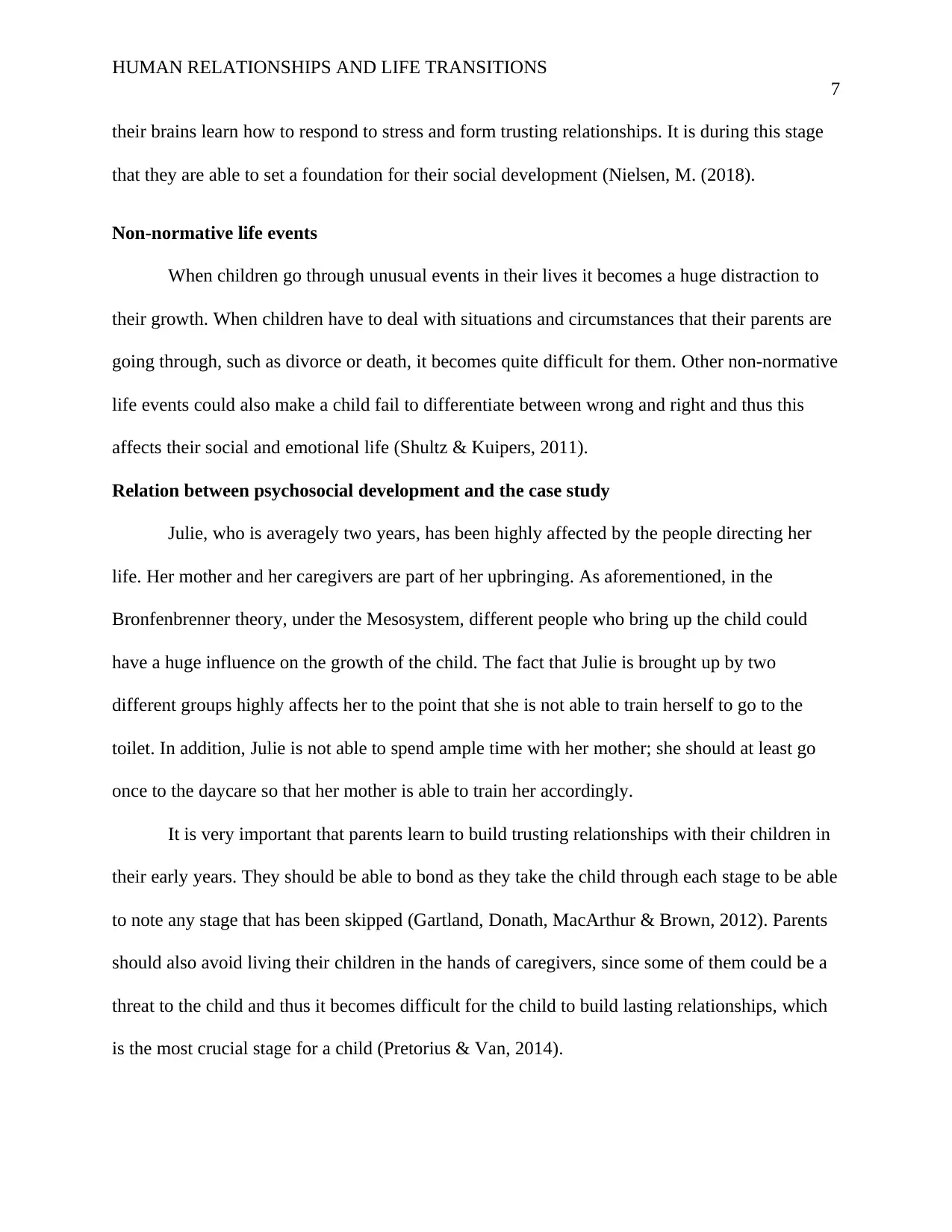
HUMAN RELATIONSHIPS AND LIFE TRANSITIONS
7
their brains learn how to respond to stress and form trusting relationships. It is during this stage
that they are able to set a foundation for their social development (Nielsen, M. (2018).
Non-normative life events
When children go through unusual events in their lives it becomes a huge distraction to
their growth. When children have to deal with situations and circumstances that their parents are
going through, such as divorce or death, it becomes quite difficult for them. Other non-normative
life events could also make a child fail to differentiate between wrong and right and thus this
affects their social and emotional life (Shultz & Kuipers, 2011).
Relation between psychosocial development and the case study
Julie, who is averagely two years, has been highly affected by the people directing her
life. Her mother and her caregivers are part of her upbringing. As aforementioned, in the
Bronfenbrenner theory, under the Mesosystem, different people who bring up the child could
have a huge influence on the growth of the child. The fact that Julie is brought up by two
different groups highly affects her to the point that she is not able to train herself to go to the
toilet. In addition, Julie is not able to spend ample time with her mother; she should at least go
once to the daycare so that her mother is able to train her accordingly.
It is very important that parents learn to build trusting relationships with their children in
their early years. They should be able to bond as they take the child through each stage to be able
to note any stage that has been skipped (Gartland, Donath, MacArthur & Brown, 2012). Parents
should also avoid living their children in the hands of caregivers, since some of them could be a
threat to the child and thus it becomes difficult for the child to build lasting relationships, which
is the most crucial stage for a child (Pretorius & Van, 2014).
7
their brains learn how to respond to stress and form trusting relationships. It is during this stage
that they are able to set a foundation for their social development (Nielsen, M. (2018).
Non-normative life events
When children go through unusual events in their lives it becomes a huge distraction to
their growth. When children have to deal with situations and circumstances that their parents are
going through, such as divorce or death, it becomes quite difficult for them. Other non-normative
life events could also make a child fail to differentiate between wrong and right and thus this
affects their social and emotional life (Shultz & Kuipers, 2011).
Relation between psychosocial development and the case study
Julie, who is averagely two years, has been highly affected by the people directing her
life. Her mother and her caregivers are part of her upbringing. As aforementioned, in the
Bronfenbrenner theory, under the Mesosystem, different people who bring up the child could
have a huge influence on the growth of the child. The fact that Julie is brought up by two
different groups highly affects her to the point that she is not able to train herself to go to the
toilet. In addition, Julie is not able to spend ample time with her mother; she should at least go
once to the daycare so that her mother is able to train her accordingly.
It is very important that parents learn to build trusting relationships with their children in
their early years. They should be able to bond as they take the child through each stage to be able
to note any stage that has been skipped (Gartland, Donath, MacArthur & Brown, 2012). Parents
should also avoid living their children in the hands of caregivers, since some of them could be a
threat to the child and thus it becomes difficult for the child to build lasting relationships, which
is the most crucial stage for a child (Pretorius & Van, 2014).
Paraphrase This Document
Need a fresh take? Get an instant paraphrase of this document with our AI Paraphraser
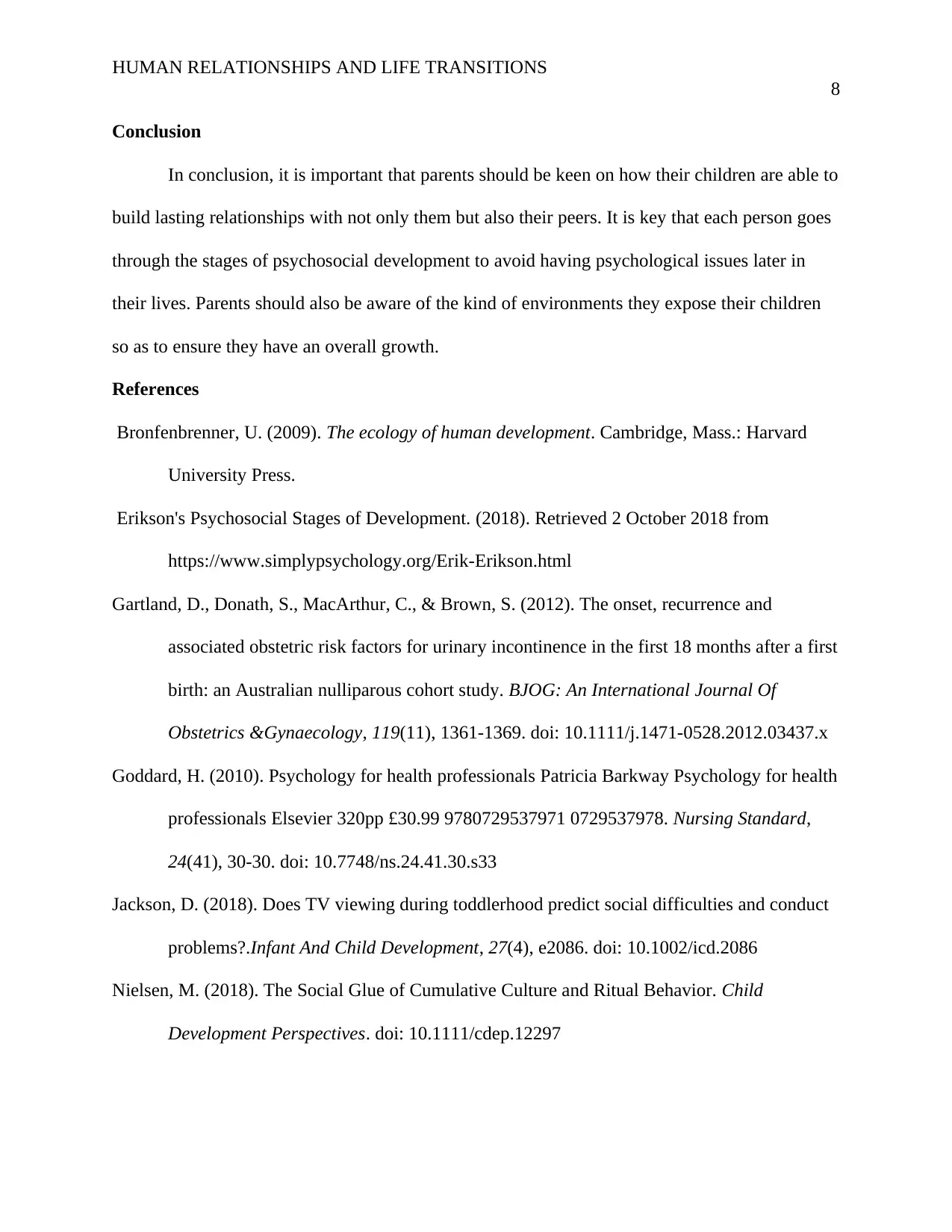
HUMAN RELATIONSHIPS AND LIFE TRANSITIONS
8
Conclusion
In conclusion, it is important that parents should be keen on how their children are able to
build lasting relationships with not only them but also their peers. It is key that each person goes
through the stages of psychosocial development to avoid having psychological issues later in
their lives. Parents should also be aware of the kind of environments they expose their children
so as to ensure they have an overall growth.
References
Bronfenbrenner, U. (2009). The ecology of human development. Cambridge, Mass.: Harvard
University Press.
Erikson's Psychosocial Stages of Development. (2018). Retrieved 2 October 2018 from
https://www.simplypsychology.org/Erik-Erikson.html
Gartland, D., Donath, S., MacArthur, C., & Brown, S. (2012). The onset, recurrence and
associated obstetric risk factors for urinary incontinence in the first 18 months after a first
birth: an Australian nulliparous cohort study. BJOG: An International Journal Of
Obstetrics &Gynaecology, 119(11), 1361-1369. doi: 10.1111/j.1471-0528.2012.03437.x
Goddard, H. (2010). Psychology for health professionals Patricia Barkway Psychology for health
professionals Elsevier 320pp £30.99 9780729537971 0729537978. Nursing Standard,
24(41), 30-30. doi: 10.7748/ns.24.41.30.s33
Jackson, D. (2018). Does TV viewing during toddlerhood predict social difficulties and conduct
problems?.Infant And Child Development, 27(4), e2086. doi: 10.1002/icd.2086
Nielsen, M. (2018). The Social Glue of Cumulative Culture and Ritual Behavior. Child
Development Perspectives. doi: 10.1111/cdep.12297
8
Conclusion
In conclusion, it is important that parents should be keen on how their children are able to
build lasting relationships with not only them but also their peers. It is key that each person goes
through the stages of psychosocial development to avoid having psychological issues later in
their lives. Parents should also be aware of the kind of environments they expose their children
so as to ensure they have an overall growth.
References
Bronfenbrenner, U. (2009). The ecology of human development. Cambridge, Mass.: Harvard
University Press.
Erikson's Psychosocial Stages of Development. (2018). Retrieved 2 October 2018 from
https://www.simplypsychology.org/Erik-Erikson.html
Gartland, D., Donath, S., MacArthur, C., & Brown, S. (2012). The onset, recurrence and
associated obstetric risk factors for urinary incontinence in the first 18 months after a first
birth: an Australian nulliparous cohort study. BJOG: An International Journal Of
Obstetrics &Gynaecology, 119(11), 1361-1369. doi: 10.1111/j.1471-0528.2012.03437.x
Goddard, H. (2010). Psychology for health professionals Patricia Barkway Psychology for health
professionals Elsevier 320pp £30.99 9780729537971 0729537978. Nursing Standard,
24(41), 30-30. doi: 10.7748/ns.24.41.30.s33
Jackson, D. (2018). Does TV viewing during toddlerhood predict social difficulties and conduct
problems?.Infant And Child Development, 27(4), e2086. doi: 10.1002/icd.2086
Nielsen, M. (2018). The Social Glue of Cumulative Culture and Ritual Behavior. Child
Development Perspectives. doi: 10.1111/cdep.12297
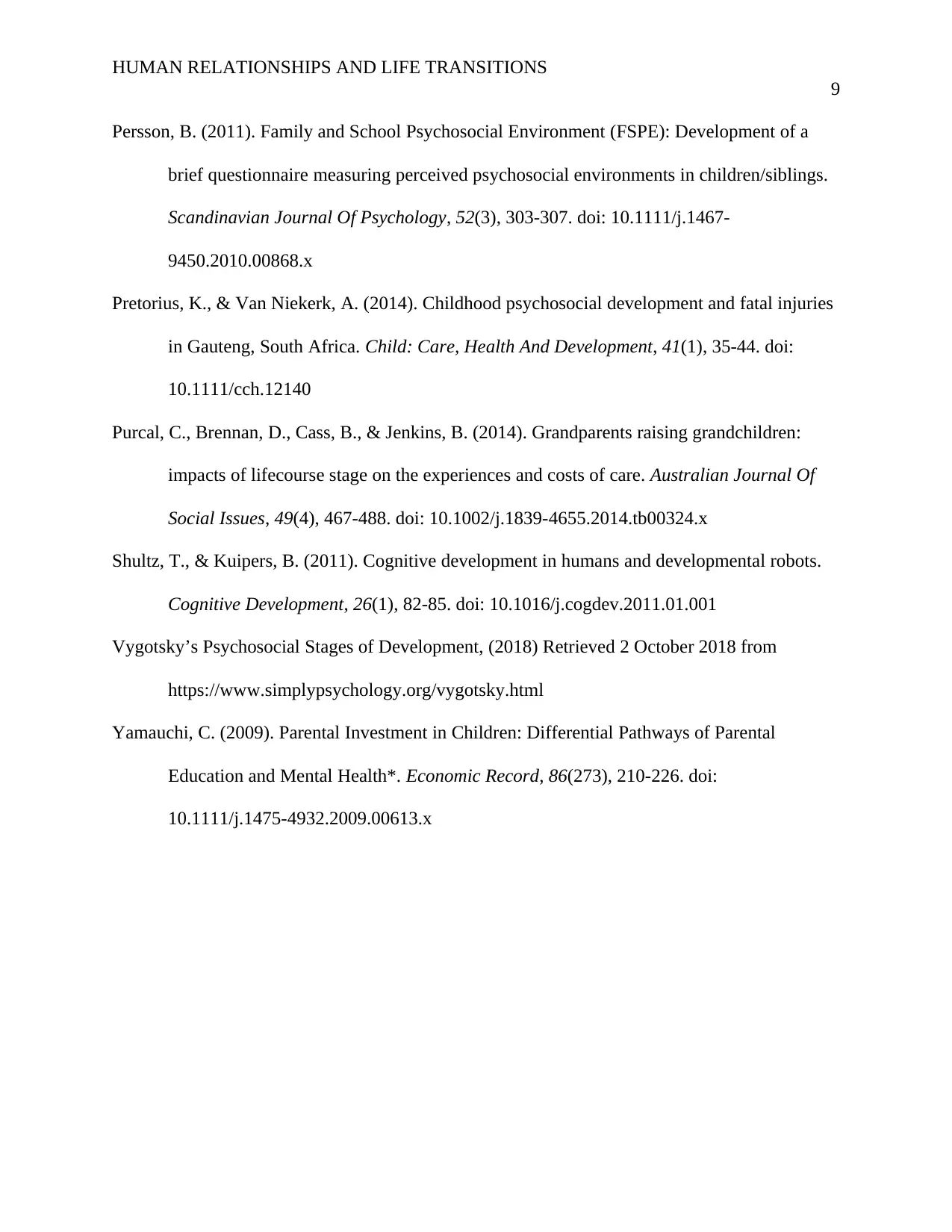
HUMAN RELATIONSHIPS AND LIFE TRANSITIONS
9
Persson, B. (2011). Family and School Psychosocial Environment (FSPE): Development of a
brief questionnaire measuring perceived psychosocial environments in children/siblings.
Scandinavian Journal Of Psychology, 52(3), 303-307. doi: 10.1111/j.1467-
9450.2010.00868.x
Pretorius, K., & Van Niekerk, A. (2014). Childhood psychosocial development and fatal injuries
in Gauteng, South Africa. Child: Care, Health And Development, 41(1), 35-44. doi:
10.1111/cch.12140
Purcal, C., Brennan, D., Cass, B., & Jenkins, B. (2014). Grandparents raising grandchildren:
impacts of lifecourse stage on the experiences and costs of care. Australian Journal Of
Social Issues, 49(4), 467-488. doi: 10.1002/j.1839-4655.2014.tb00324.x
Shultz, T., & Kuipers, B. (2011). Cognitive development in humans and developmental robots.
Cognitive Development, 26(1), 82-85. doi: 10.1016/j.cogdev.2011.01.001
Vygotsky’s Psychosocial Stages of Development, (2018) Retrieved 2 October 2018 from
https://www.simplypsychology.org/vygotsky.html
Yamauchi, C. (2009). Parental Investment in Children: Differential Pathways of Parental
Education and Mental Health*. Economic Record, 86(273), 210-226. doi:
10.1111/j.1475-4932.2009.00613.x
9
Persson, B. (2011). Family and School Psychosocial Environment (FSPE): Development of a
brief questionnaire measuring perceived psychosocial environments in children/siblings.
Scandinavian Journal Of Psychology, 52(3), 303-307. doi: 10.1111/j.1467-
9450.2010.00868.x
Pretorius, K., & Van Niekerk, A. (2014). Childhood psychosocial development and fatal injuries
in Gauteng, South Africa. Child: Care, Health And Development, 41(1), 35-44. doi:
10.1111/cch.12140
Purcal, C., Brennan, D., Cass, B., & Jenkins, B. (2014). Grandparents raising grandchildren:
impacts of lifecourse stage on the experiences and costs of care. Australian Journal Of
Social Issues, 49(4), 467-488. doi: 10.1002/j.1839-4655.2014.tb00324.x
Shultz, T., & Kuipers, B. (2011). Cognitive development in humans and developmental robots.
Cognitive Development, 26(1), 82-85. doi: 10.1016/j.cogdev.2011.01.001
Vygotsky’s Psychosocial Stages of Development, (2018) Retrieved 2 October 2018 from
https://www.simplypsychology.org/vygotsky.html
Yamauchi, C. (2009). Parental Investment in Children: Differential Pathways of Parental
Education and Mental Health*. Economic Record, 86(273), 210-226. doi:
10.1111/j.1475-4932.2009.00613.x
1 out of 9
Related Documents
Your All-in-One AI-Powered Toolkit for Academic Success.
+13062052269
info@desklib.com
Available 24*7 on WhatsApp / Email
![[object Object]](/_next/static/media/star-bottom.7253800d.svg)
Unlock your academic potential
© 2024 | Zucol Services PVT LTD | All rights reserved.




